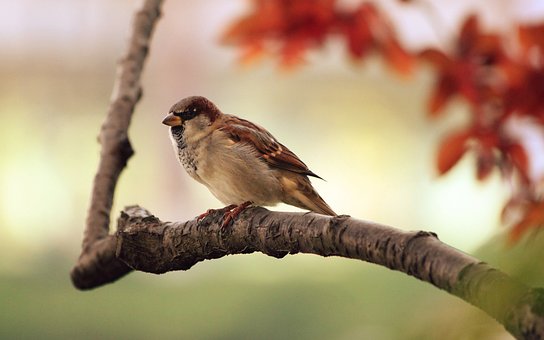Cute Birds are among the most beautiful creations in nature. They have two legs, a bill or beak, and feathers. At the moment. There are almost 10,000 species of birds that come in a variety of sizes and colors. The ostrich is the largest living bird, while the hummingbird is the smallest. You can also distinguish birds using feet, beaks or wings in other ways. You can see the different species from all over the globe. There are many species of birds: water birds, land birds and arctic birds. Here’s a list of the 10 most adorable birds in the world.
1.Red-billed leiothrix
The family Leiothrichidae’s red-billed leiothrix has the most adorable bird in the world. This bird is native to the Himalayas and southern China. The appearance of adult birds is unique. They have reddish-orange eyes and dull yellow rings around their eyes. However, their backs are dull olive green. They also have bright yellow-orange throats and a yellow chin that makes them stand out. Pekin robin, Japanese nightingale and Japanese (hill), robin have been introduced to new areas of the world.
2.Indian Paradise Flycatcher
Indian Paradise Flycatcher, a cute and small bord that is native to Asia, is found all over the world. The adult flycatchers have an elongated tail feather and rufous plumage. Some populations have black plumage, while others have white plumage. Once, females were known to have a short tail and rufous wings. They also had a blackhead. Bird species love to eat insects and they often capture them in the air, often under densely canopied trees. Corvus paradis, as Linnaeus called them in 1758, is now part of the Monarchidae family with monarch flycatchers. Male and female adult species can reach 19-22 cm (7.5-8.7 inches) in length.
3.Indian White-Eye

The Indian white-eye, also known as the Oriental White-eye, is a cute passerine bird that belonged to the white eye family. It can be found in small groups and is usually seen in open woodlands on the Indian subcontinent. It was once a nectar-feeder and is easily identifiable by its distinctive white eye-ring, yellowish upperparts and overall yellowish appearance. It is also found in Indonesia and Malaysia. The first description was made by Dutch zoologist Coenraad Temminck, who used a Bengal specimen to describe the species. The species’ English name is Oriental white-eye. This is due to its geographical range.
4.Red-breasted Flycatcher
The Red-breasted Flycatcher, a small flycatcher, has a rusty orange throat that extends onto the breast. Each species has a distinct tail pattern, with a black terminal bar on the sides and a white side. These bird species were able to survive in deciduous mixed forests, winters in forests, woodlands, and parks. It makes a sound similar to a “zrrt”, which is slower than that of a Taiga Flycatcher. It is easy to see the white coloring of the eyes and plain wings.
5.Long-Tailed Bushtit
The Long-Tailed Bushtit, also known as the long-tailed Tit, is one of the most adorable birds in the world. It can be found mostly in Europe and the Palearctic. These bird species are part of the genus Aegithalos, which Aristotle used for several European tits including the long-tailed. Carl Linnaeus, a Swedish naturalist, first described it in 1758 under the binomial Parus caudatus. These cute birds can grow to 3-15 cm (5-6in) in length and have a 7-9cm (3-3 1/2in) tail.
6.Kinglets
Kinglets, which look very similar to the titmice, are one of the cute and small birds in the Regulidae family. This bird species is found in North America and Eurasia. There are seven species within the Madeira firecrest family. It can grow to approximately 6-8 g (0.22 – 0.28 oz) and can reach heights of 8-11 cm (3-4 in). It has a grey-green plumage and a tail tip that is incised. The male species has distinctive head markings, while the females have a colorful crown patch.
7.Nightjar

Nightjars, which are cute little birds of medium size, belong to the Caprimulgidae family. They are either nocturnal birds or crepuscular birds. Their distinctive features include long wings, very short bills and short legs. Nighthawks are a new category of bird species. Nightjar refers to the European nightjar. Except for New Zealand and certain islands in Oceania, all nightjars can be seen around the world. It is a ground-based species that thrives on grass and has a habit of resting on roads.
8.Coppersmith barbet
Coppersmith barbet is also known as Crimson-breasted or coppersmith. It is well-known for its metronomic sound that sounds like a coppersmith striking the metal with a hammer. It is a striking appearance with crimson eyebrows, most commonly found in parts of Southeast Asia and the Indian subcontinent. It used to build a nest in trees and then live there. It has been known to eat insects, particularly winged termites. It has a green colour, with a reddish head and yellow cheeks. It can grow to 15-17 cm (5.9-6.8 in) in length and weighs between 30-52.6g (1.06-1.86oz).3
9.Tufted titmouse
The songbird, the tufted titmouse, is native to North America. The black-crested Titmouse is a subspecies of this bird. It is found in central and southern Texas. This bird species can grow to 5.5-6.3 inches in length and weighs 0.6-0.9 oz. It has a wingspan between 7.9-10.2 inches. They are small, cute birds that can be described as whistled peter-peter–peters. However, they can take on many forms. It has a white front and a grey upper body, with rust-coloured flanks. Their heads are black with a grey crest and tuft on the forehead.
10.American yellow warbler
The American yellow warbler, also known as the yellow-bellied warbler, is found in North America, the Caribbean and northern South America. Sometimes, it is called a “summer yellowbird”. It can grow to between 10 and 18cm (3.9 to 7.1in) in length and have a wingspan 16 to 22cm (6.3 to 8.7in). The appearance of the subspecies is similar. They have duller yellow wings and greenish-yellow uppersides. The head of female species is somewhat duller. The eyes are dark and have a thin, narrow beak. The feet are either lighter or darker olive-buff.






